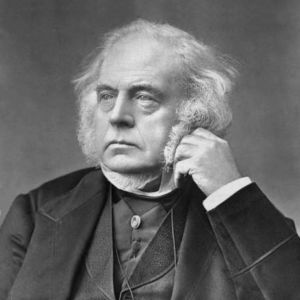The just-completed election has been analyzed in terms of people who felt politically ignored, demeaned or attacked. Donald Trump’s campaign clearly claimed he would put their concerns first. Unfortunately, the protectionist “solutions” he has proposed cannot fix them.
Protectionism is among the most damaging things a country can do to itself. Henry George described it as doing to ourselves what enemies try to do to us in wartime — blockade our trade with others. It uses government coercion to impoverish its own citizens by undermining the massive gains in production, and therefore consumption, that specialization and trade would create for them. Because restrictions on willing trading partners’ offerings reduce the real purchasing power of incomes, Auberon Herbert described it as a war of the protected on the unprotected.
That is why the Trump victory aftermath is a great time to remember one of history’s most influential free traders — John Bright. Along with Richard Cobden, he led the campaign that ended England’s protectionist Corn Laws in 1846, inaugurating one of history’s freest trade eras, accompanied by increased prosperity and peace. It is worth reconsidering Bright’s case for international economic freedom — the ability to choose our own voluntary relationships with people from other countries:
—“I care for the condition of the people among whom I live … unless the beauty of your legislation and the excellence of your statesmanship are impressed there on the feelings and condition of the people … you have yet to learn the duties of government.”
—“(I wish) to see my countrymen free, and able to enjoy the fruits of their labor.”
—“To be a man … he must have food, and to be a healthy man one would say that it was necessary he should have a free market for the purchase of his food. To be a working-man he must have materials with which to work, and it would seem reasonable that he should have a free market for the purchase of materials. More than that, as far as possible, he should have a free market for the sale of his materials.”
—“Force is not a remedy.”
—“(Trade restrictions) bring … suffering, discontent and insubordination.”
—“Trade should be as free as the winds.”
—“To sell freely would be a great advantage, as to buy freely is a great advantage; but neither to buy freely nor to sell freely, as the Fair Traders recommend, would … enormously increase the injury.”
—“Many people … think that because other countries do not allow us to send our goods into their market free of duty, therefore we should not allow them to send their goods to this market free of duty. They think two bad things are better than one.”
—“The Corn Law (repeal) … tells … what freedom has done … and it points the way to other paths of freedom which yet lie open …”
—“All this has been done by merely … allowing people their natural freedom to buy and sell where they could buy and sell to the greatest advantage.”
—“What a grand thing it is to establish our laws upon a basis of freedom and justice …(not) so unjust, so cruel to the bulk of their countrymen.”
—“We shall reap even greater gain from our policy of Free Trade in the future than we have reaped in the past.”
John Bright led the Free Trade movement in 19th-century England, because, in Richard Barry O’Brien’s words, “Bright loved justice and freedom, and had faith in the people.” According to Nicholas Elliott, “John Bright did more than anyone else to bring about the great advances for liberty in 19th-century Britain,” because “he helped to establish free trade as a popular principle which no politician would dare to interfere with for years to come.”
John Bright saw that international as well as domestic government restrictions on voluntary arrangements were unjustified applications of government coercion that harmed a country’s citizens. Unfortunately, our president-elect is far less concerned with liberty, and the benefits it provides for all, in our international relations. We would gain from relearning the Bright idea that “allowing people their natural freedom” is a benefit and not a burden.

